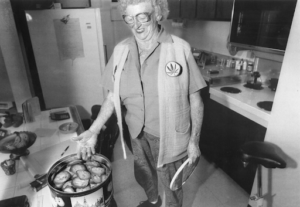There’s no doubt that the cannabis industry has been growing leaps and bounds. Medical marijuana has been legalized in the majority of states, and recreational cannabis legislation had a blockbuster year in 2019. By the end of the year, even the federal government was making recommendations about descheduling marijuana. As of 2022, 18 states have legalized recreational cannabis and 37 have legalized medical cannabis. Even more states have legislation in the works.
The industry isn’t bound to US shores either. Germany has one of Europe’s largest medical marijuana markets, and it’s considering recreational legalization. This could lead the way for the rest of the EU. North of the 49th parallel, Canada became the first G8 nation to legalize recreational cannabis nationwide in 2018. Uruguay was the first country in the world to legalize cannabis for recreational use.
All in all, the rise of the cannabis industry has been remarkable. But there’s yet another amazing story embedded in the green wave: Much of the industry’s success is being driven by women.
As a women-owned marketing agency specializing in cannabis, the work of the women that came before us is something we often think about. So, to celebrate International Women’s Day this year, we want to look both back to the past and forward to the future to celebrate the inspirational women who have long driven positive economic and social change within the cannabis space, and continue to make it more inclusive and open for all.
Women Leading the Green Charge
People typically associate marijuana with men. Most of our stereotypes about “stoners” focus on young men. If we think about the realities of the black market, we often associate that with men too.
That doesn’t mean women weren’t involved in the black market or that they never touched cannabis prior to legalization. It was considered less socially acceptable in some circles, and these attitudes may have contributed to the initial invisibility of women in the cannabis movement.
In fact, some of the first advocates for medical marijuana were women. We have stories like that of Mary Rathubun, a hospital volunteer in the late 1980s and early 1990s who baked “special” brownies for patients suffering from HIV/AIDS. She had noted that cannabis seemed to ease pain for these patients.
We have stories like that of Mary Rathubun, a hospital volunteer in the late 1980s and early 1990s who baked “special” brownies for patients suffering from HIV/AIDS. She had noted that cannabis seemed to ease pain for these patients.
Women’s involvement with cannabis advocacy may also harken back to a long tradition of caretaking. Women in many communities acted as healers and, before the advent of modern medicine, would use traditional knowledge of plants to help people with all kinds of ailments. For many cultures, this kind of traditional knowledge involved cannabis too.
It may be little wonder that we see more women taking up cannabis to assist with conditions that disproportionately affect them, such as anxiety. In turn, women have been instrumental in advocating for and building the industry.
The Changing Face of an Industry
Shauna Blackburn, Executive Accounts Director & Risk Manager at Cannabis Connect Insurance, has been involved in California’s legal market for nearly a decade and a half, in a few different ways. She started out growing hemp for California’s nascent medical market in the early 2000s. Today, she runs a CBD outfit that focuses on products like bath bombs and skincare.
Blackburn’s biggest win, however, is her involvement in the insurance industry. She was part of a group that created the very first cannabis-specific policies. Later on, she left that company to work with Cannabis Connect, which is focused on underwriting for those in the cannabis industry.
Blackburn’s long involvement in the industry has allowed her to see it evolve. In an interview with Mary Jane Marketer, she suggested that, in the early days, it wasn’t uncommon to run into women running their own companies, particularly in the cultivation sector of the industry. She recalls that the first few conventions she attended seemed to be women-dominated.
She said that’s started to change in the last few years. As more corporate dollars have poured into a legalized industry, there appear to be more men in the industry now.
She cited a few possible reasons why. “More men are coming out of the black market,” she commented, “so they’re just now becoming visible. They’ve always been there though.” While she felt mergers and acquisitions may have played a role in this change too, she also felt that many female business leaders had taken these opportunities to move on to new ventures. As a result, another wave of women-led initiatives could be coming soon.
Women-Led Businesses Already Making a Splash
Blackburn’s predictions may not be too far off. There are already plenty of women-led companies populating the cannabis industry.
Take, for example, The Galley, based out of Santa Rosa, California. Proprietors Annie Holman and Gina Pippen craft cannabis-infused products for a wide range of brands. Holman acknowledges the need to back small and legacy cannabis companies, especially after new regulations in California have given larger operations an advantage.
Mary’s Jane is another women-led beauty line, based out of Southern California. Many of the products incorporate CBD for pain relief. There are even some that focus specifically on menstrual relief.
In Oregon, Lady Jays is another evolution for the cannabis branding and creative agency Ladies of Paradise. The retro styling of the products is intended to speak to women, who may feel left out in the cold by marketing that targets men.
In cannabis-adjacent industries, women are also leading the charge. Ladies of Paradise is one example; the team here at Mary Jane Marketer is another women-led creative agency catering to the cannabis industry.
And there are, of course, women like Shauna Blackburn, who have married professional experience with a passion to address growing needs in the industry. Blackburn is one of the few insurers who offer policies designed specifically to address the needs of those in the cannabis industry.
At the Intersection of Gender and Race
Of course, one can’t celebrate women in cannabis without acknowledging the contribution of women of color, including Black women, Hispanic women, and others.
While women as a group face challenges in the cannabis industry, especially as it changes and grows, those who claim other minoritized and marginalized identities face even larger uphill battles. Many have pointed to the problem of cannabis criminalization, which has affected people of color disproportionately. Many women of color have had their children removed from their care or even been involved in the criminal justice system due to their involvement with cannabis. It’s something the industry must reckon with—especially in an environment where white women can wax poetic about how cannabis can help them be better mothers.
To that end, many are calling for recognition and additional industry support for people of color. As legalization progresses, this means more than simply pardoning people or clearing criminal records.
It means lending support to and creating an environment for businesses owned and operated by people of color to thrive.
The cannabis industry may just follow through on this initiative. Already, there are many women of color starting up businesses and driving them forward. We can look at the example of Nia Jones and Malaika Jones Bebede, who started Brown Girl Jane. Not only does this brand focus on natural, plant-based wellness and helping “badass women manage full lives,” the company also gives back. A portion of each sale is donated to charities that support women of color.
On the medical side of the industry, there are figures like Roz McCarthy, who founded the non-profit Minorities for Medical Marijuana (M4MM). Based out of Orlando, Florida, M4MM now has chapters across the United States. It provides tools and training for people of color and other minoritized groups to start businesses, advocate for medical marijuana, and more.
Legalization and Social Justice
The current wave of cannabis legalization is showing some positive signs of addressing the painful legacy of the country’s war on drugs. Female activists and lawmakers often lead the way in introducing legislation that not merely legalizes cannabis, but recognizes that the war on drugs was and continues to be a racist set of policies and laws that intentionally discriminated against communities of color for decades. Many states are now introducing legalization policies that factor in criminal justice, community investment opportunities, and economic equity.
The New Jersey legalization framework illustrates this trend. Prior to legalization, black residents were jailed at nearly 13 times the rate of white residents for cannabis possession, despite similar usage rates. New laws seek to address this clear trend of discrimination by directing sales taxes and a “social equity excise fee” towards state initiatives deemed that work to remedy racial and economic injustice in New Jersey. The state has also introduced progressive expungement reform policies and features priority “social equity” cannabis business applications for minorities, women, disabled veterans, and entrepreneurs from communities previously targeted by discriminatory drug policies.
 Countless New Jersey women helped prioritize this kind of progressive approach to cannabis legalization. Chief among them is Dianna Houenou. Serving as the Chair of the New Jersey Cannabis Regulatory Commission, Houenou has years of government experience working to advance criminal justice priorities, including expungement reform and cannabis legalization. Prior to joining state government, Houenou was Policy Counsel with the American Civil Liberties Union of New Jersey (ACLU-NJ), where she developed legislative strategies and led the organization in their advocacy for cannabis legalization and Newark police reform.
Countless New Jersey women helped prioritize this kind of progressive approach to cannabis legalization. Chief among them is Dianna Houenou. Serving as the Chair of the New Jersey Cannabis Regulatory Commission, Houenou has years of government experience working to advance criminal justice priorities, including expungement reform and cannabis legalization. Prior to joining state government, Houenou was Policy Counsel with the American Civil Liberties Union of New Jersey (ACLU-NJ), where she developed legislative strategies and led the organization in their advocacy for cannabis legalization and Newark police reform.
Welcome to the Cannabis Community
 And there are women of color in cannabis-adjacent industries as well, like Kahshanna Evans, who runs New York-based PR firm Kissing Lions. Evans, who is working with historian and LadyJane Branding CEO Jennifer Whetzel on the first-ever Women in Cannabis study, is excited about the growth of CBD in the wellness environment—and about the involvement of women-led businesses.
And there are women of color in cannabis-adjacent industries as well, like Kahshanna Evans, who runs New York-based PR firm Kissing Lions. Evans, who is working with historian and LadyJane Branding CEO Jennifer Whetzel on the first-ever Women in Cannabis study, is excited about the growth of CBD in the wellness environment—and about the involvement of women-led businesses.
When asked why, Evans cites the way the cannabis industry has already become “a more accessible industry for women, LGBTQ, and non-binary professionals.” She’s been buoyed by the ability to connect with people “who are fighting for fair policies, who value work-life balance, and have as much of an affinity for wellness as I do.”
Shauna Blackburn of Cannabis Connect Insurance echoed these sentiments, calling the cannabis industry a community. Evans suggested the cannabis industry seems willing—and maybe even able—to break the mold set by other, more established industries, and move away from structures that “hinder equal opportunity and parity in the workplace.”
Evans and Blackburn may be right to be so optimistic. After all, the cannabis industry has been a leader in female representation at the top levels. As the global industry moves toward $150 billion in revenue, these entrepreneurs and CEOs are being given space to re-envision what the world of work would look like. So far, the answer seems to be a space where people are valued and companies grow as a result.
Why Women, and Why Cannabis?
It’s no secret that women face challenges in many industries, so it may be surprising to some that so many women are involved in the cannabis industry: innovating new services, leading businesses, developing brands, and reimagining the rules of big business.
The growing medical literature on cannabis’s medicinal uses has probably been one of the factors spurring women’s interest in this industry. Take, for example, the plight of Charlotte Figi, a child whose Dravet’s syndrome was vastly improved by CBD. Her mother had tried everything under the sun to help her child and turned to CBD in desperation.
No doubt many women connected to the story of a mother who wanted to help her child. Others may have been inspired by how medical marijuana has touched the lives of other women, such as helping breast cancer patients manage the side effects of treatment. Many women also live with health issues such as migraines and debilitating menstrual cramps. More women than men are also affected by mental health issues like depression and anxiety.
There’s a growing body of literature that suggests cannabis, and CBD in particular, could help with all these conditions. Given that women’s concerns are often dismissed or misdiagnosed by the medical community, it’s little wonder that they’d feel they should advocate for something that seems to have helped so many—and may have the potential to help so many more.
Women’s traditional roles as caretakers also come into play here. We can think of mothers advocating for their children, daughters looking after the health of aging parents, or even women looking out for their partners. Today, women are increasingly asked to shoulder the burden of caretaking and a career, leading to additional stress, burnout, and more.
Self-care, family caretaking, and more dovetail with cannabis advocacy. And there’s little doubt that many women also see an opportunity to help get CBD and cannabis into the hands of those it can help.
With all this in mind, it’s easy to see why women have become more frequent consumers of cannabis and why women have led the charge for legalization and creating innovative companies.
It’s not just a business opportunity or a way to better their own lives—it’s a way to help the people around them live life to its fullest.
Women Lead the Way
Whether it has more to do with traditional knowledge, an innate desire to care for others, or just good business sense, there’s no doubt that women have made their mark in the cannabis industry. What’s more, is that there’s little doubt they’ll continue to do so.
Already, women-led brands are helping to create products that cater to women’s concerns and needs, as well as businesses that address the needs of a growing, newly legal industry made possible through the dedicated work of countless female lawmakers and activists. As the cannabis industry grows, it will no doubt continue to be led by innovative and insightful women.